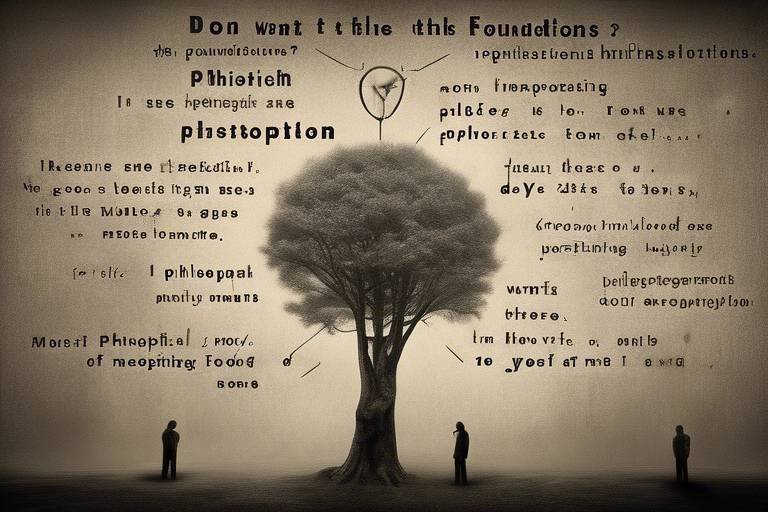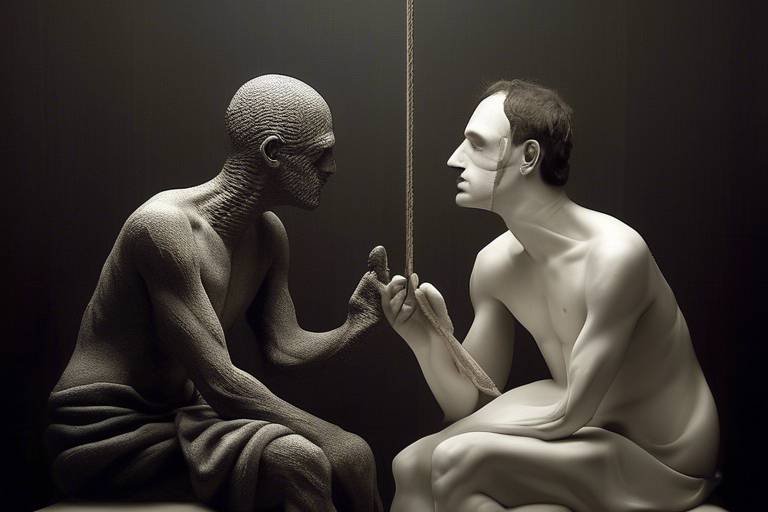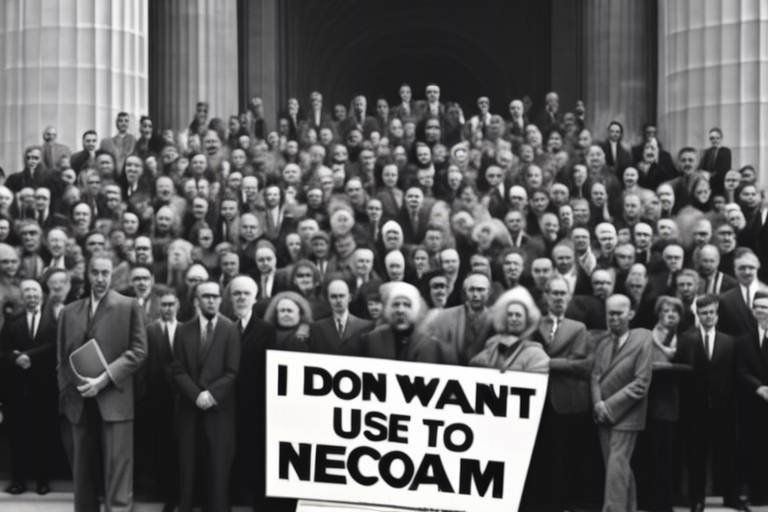Constructing the Ideas of Truth - A Philosophical Perspective
Truth is one of those concepts that seems simple on the surface but reveals a labyrinth of complexities when you dive deeper. Think of it as a vast ocean; while the surface might look calm and clear, beneath lies a world full of currents, creatures, and mysteries waiting to be explored. In this article, we will embark on a journey through the multifaceted nature of truth, examining various philosophical approaches and implications. From ancient thinkers who laid the groundwork to contemporary debates that challenge our understanding, we’ll unearth how truth has evolved and continues to shape our society.
So, why should we care about truth? Well, consider this: our perceptions of truth influence everything from personal relationships to global politics. When we talk about truth, we’re not just discussing abstract ideas; we’re talking about the foundation upon which we build our beliefs, make decisions, and interact with the world around us. It’s the lens through which we view our experiences and the guide that helps us navigate the complexities of life.
Throughout history, philosophers have grappled with the concept of truth, each bringing their unique perspectives to the table. Some have argued that truth is a reflection of reality, while others contend that it’s a construct shaped by our beliefs and experiences. This article will examine these diverse viewpoints, shedding light on how they contribute to our understanding of truth today.
As we delve into the historical evolution of truth, we will uncover the shifts in philosophical thought that have occurred over the centuries. From the ancient Greeks, who began to formalize ideas about truth, to modern thinkers who challenge traditional notions, the journey of truth is as rich and varied as the cultures that have explored it. Each philosophical era has left its mark, influencing how we perceive truth and its role in our lives.
Get ready to explore the depths of philosophical theories, including correspondence, coherence, and pragmatic theories of truth. Each theory offers a unique lens through which we can examine the significance of truth in philosophical discourse. Whether you’re a seasoned philosopher or a curious newcomer, this exploration promises to be enlightening and thought-provoking.
In conclusion, understanding the ideas surrounding truth is not just an academic exercise; it’s a vital part of our human experience. As we navigate through the complexities of life, the pursuit of truth remains a guiding principle, helping us discern what is real and meaningful. So, let’s embark on this philosophical adventure together, unraveling the intricate tapestry of truth and its implications for our lives.
- What is the significance of truth in philosophy? Truth is foundational in philosophy as it shapes our understanding of reality and influences our beliefs and actions.
- How have historical perspectives on truth evolved? Historical perspectives have shifted from ancient philosophical interpretations to contemporary debates that challenge traditional notions.
- What are the main theories of truth? The main theories include correspondence theory, coherence theory, and pragmatic theory, each offering unique insights into the nature of truth.
- Why is pragmatism important in understanding truth? Pragmatism emphasizes the practical consequences of truth, highlighting its relevance in real-world contexts and everyday life.

The Historical Evolution of Truth
Understanding the historical context of truth reveals how philosophical thought has evolved over centuries. Truth, a concept often taken for granted in modern discourse, has undergone significant transformations from ancient times to the present day. Ancient philosophers like Socrates and Plato laid the groundwork for our understanding of truth, often associating it with a higher realm of forms and ideals. For them, truth was not merely a reflection of the physical world but rather a deeper, more abstract concept that transcended mere appearances.
As we move through history, we encounter the rise of empiricism during the Enlightenment, where philosophers like John Locke emphasized the importance of sensory experience in the pursuit of truth. This period marked a significant shift, as the focus moved from abstract ideals to observable phenomena. The empiricists argued that knowledge and truth must be grounded in experience, leading to a more scientific approach to understanding reality.
Fast forward to the 19th and 20th centuries, we see the emergence of various philosophical movements that challenge traditional notions of truth. The existentialists, for instance, posited that truth is subjective and deeply personal. Thinkers like Friedrich Nietzsche famously declared, “There are no facts, only interpretations.” This perspective suggests that truth is not an objective reality but rather a construct shaped by individual experiences and societal contexts.
In contemporary discussions, the debate over truth has become increasingly complex. The advent of postmodernism has further blurred the lines, questioning the very foundations of what we consider to be true. With the rise of digital media and information overload, the implications of truth in society have never been more pressing. We now grapple with issues of fake news, misinformation, and the subjectivity of truth in a world where everyone can be a publisher.
To summarize the historical evolution of truth, we can outline key philosophical movements and their perspectives:
| Period | Philosophers | Key Ideas |
|---|---|---|
| Ancient | Socrates, Plato | Truth as an ideal form |
| Enlightenment | John Locke, David Hume | Empiricism and sensory experience |
| 19th Century | Friedrich Nietzsche | Subjectivity of truth |
| 20th Century | Postmodernists | Truth as a social construct |
This historical journey through the concept of truth not only highlights its evolving nature but also emphasizes the importance of critically engaging with the idea of truth in our own lives. As we navigate a world filled with competing narratives, understanding the philosophical underpinnings of truth can help us discern what is genuinely meaningful and relevant.

Philosophical Theories of Truth
The concept of truth has been a central theme in philosophy, and various theories have emerged over the centuries to explain its nature. Each theory offers a distinct lens through which we can examine what truth means and how it operates within our understanding of reality. In this section, we will delve into three major philosophical theories of truth: correspondence theory, coherence theory, and pragmatic theory. Each of these theories presents unique insights and implications, shaping the discourse on truth in profound ways.
First up is the correspondence theory. This theory posits that truth is fundamentally about the relationship between statements and the world. In other words, a statement is true if it accurately reflects or corresponds to reality. Imagine trying to describe a sunset; if your description matches the vibrant colors and serene atmosphere of the actual sunset, then your statement is deemed true. This theory has deep roots in the works of ancient philosophers and remains influential today. However, it also faces criticism, primarily concerning the challenges of defining what it means for something to 'correspond' to reality.
Next, we have the coherence theory. Unlike correspondence theory, coherence theory suggests that truth is not about direct reflection of reality but rather about the logical consistency of a set of beliefs or propositions. Think of it as a well-structured puzzle; each piece must fit together in a way that makes sense. If your beliefs form a coherent system, then they are considered true. This perspective raises interesting questions about the nature of belief systems and how they interact with one another. Critics argue that coherence alone may not guarantee truth, as a coherent set of beliefs could still be entirely disconnected from reality.
Finally, we arrive at the pragmatic theory of truth. This approach takes a more practical perspective, asserting that truth is validated through its consequences and practical applications. In essence, if a belief works effectively in real-world situations, it is considered true. This theory emphasizes the importance of action and results over mere correspondence or coherence. For instance, if a scientific theory leads to successful predictions and technological advancements, it is deemed true based on its pragmatic utility. However, this theory is not without its challenges, as critics often question whether practical success is an adequate measure of truth.
In summary, these three philosophical theories of truth—correspondence, coherence, and pragmatism—offer distinct frameworks for understanding the complex nature of truth. Each theory invites us to ponder deeper questions about reality, belief, and the implications of what we consider to be true. As we explore these theories further, we can appreciate the rich tapestry of thought that has shaped our understanding of truth throughout history.
- What is the main idea behind correspondence theory?
Correspondence theory asserts that truth is determined by how accurately a statement reflects reality. - How does coherence theory differ from correspondence theory?
Coherence theory focuses on the logical consistency of a set of beliefs rather than their correspondence to reality. - What is the pragmatic approach to truth?
The pragmatic theory suggests that truth is validated through practical consequences and effectiveness in real-world applications.

Correspondence Theory
Correspondence theory is a fascinating concept that suggests that truth is determined by how accurately a statement or belief reflects the reality it claims to describe. Imagine you're looking at a photograph of a sunset; if the colors and scenery match what you see in real life, then the photograph is said to correspond to the actual sunset. In the same way, correspondence theory posits that a statement is true if it corresponds to the facts of the world. This theory has its roots in ancient philosophy, with notable figures like Aristotle laying the groundwork for this idea. Aristotle famously stated, "To say of what is that it is not, or of what is not that it is, is false, while to say of what is that it is, and of what is not that it is not, is true." This simple yet profound assertion captures the essence of correspondence theory.
Throughout history, various philosophers have championed this theory, emphasizing its importance in understanding the nature of truth. One of the most significant proponents was Bertrand Russell, who argued that facts exist independently of our beliefs about them. He believed that for a statement to be true, it must accurately reflect the state of affairs in the world. This idea aligns with our intuitive understanding of truth; after all, when we seek to know whether something is true, we often look for evidence that confirms its accuracy.
However, correspondence theory is not without its critiques. Some philosophers argue that the theory oversimplifies the complex nature of truth. For instance, how do we determine what constitutes 'reality'? Is reality objective, or is it shaped by our perceptions? Critics like Friedrich Nietzsche have challenged the notion of an objective reality, suggesting that truth is often subjective and influenced by cultural and personal perspectives. This raises important questions about the validity of correspondence theory in a world where perceptions can vary dramatically from person to person.
To further illustrate the nuances of correspondence theory, consider the following table, which outlines the key proponents and their contributions:
| Philosopher | Contribution |
|---|---|
| Aristotle | Introduced the foundational idea that truth is a matter of stating what is and what is not. |
| Bertrand Russell | Emphasized the importance of facts existing independently of our beliefs. |
| Friedrich Nietzsche | Critiqued the idea of an objective reality, suggesting truth is subjective. |
In summary, correspondence theory provides a compelling framework for understanding truth through its relationship with reality. While it has been influential in shaping our conception of truth, ongoing debates and critiques highlight the complexities involved in defining what is true. As we navigate these discussions, we must remain open to the idea that truth may not always be as straightforward as it seems.
- What is correspondence theory? - It is the idea that truth is determined by how accurately a statement reflects reality.
- Who are the key proponents of correspondence theory? - Notable figures include Aristotle and Bertrand Russell.
- What are some critiques of correspondence theory? - Critics argue that it oversimplifies truth and does not account for subjective perspectives.

Key Proponents of Correspondence Theory
The correspondence theory of truth has been championed by several influential philosophers throughout history, each contributing their unique perspectives and insights. At its core, this theory asserts that truth is fundamentally about the relationship between statements and the world they describe. In other words, a statement is true if it accurately reflects reality. This idea has roots that stretch back to ancient philosophers, but it was notably articulated by figures like Aristotle and later, Bertrand Russell.
Aristotle, often considered the father of Western philosophy, laid foundational concepts for correspondence theory in his work. He famously stated, "To say of what is that it is not, or of what is not that it is, is false, while to say of what is that it is, and of what is not that it is not, is true." This assertion emphasizes the importance of aligning our statements with the reality they aim to describe. Aristotle's views highlighted the necessity of a correspondence between thought and reality, which continues to resonate in contemporary discussions about truth.
Fast forward to the 20th century, and we find Bertrand Russell, a pivotal figure in analytic philosophy, advocating for a refined version of correspondence theory. Russell argued that truth is a matter of the relationship between propositions and the facts they correspond to. He introduced the concept of "truth-bearers," which refers to statements or propositions that can be true or false based on their correspondence with actual states of affairs. This innovative approach not only solidified the correspondence theory's place in modern philosophy but also sparked debates about the nature of reality and how we can access it through language.
However, the contributions of these philosophers are not without their complexities. While Aristotle and Russell provided robust frameworks for understanding truth, they also faced challenges in defining what constitutes reality itself. For instance, if truth is about correspondence, how do we determine what is real? This question has led to further philosophical inquiry and critiques, as other thinkers argue that reality is not always as straightforward as correspondence might suggest.
In summary, the key proponents of correspondence theory, such as Aristotle and Bertrand Russell, have significantly shaped our understanding of truth. Their ideas encourage us to consider not just the statements we make but also the realities they purport to represent. As we delve deeper into the philosophical landscape, we must grapple with the implications of their theories and the ongoing debates they inspire.
- What is correspondence theory?
Correspondence theory posits that a statement is true if it accurately reflects the reality it describes.
- Who are the main proponents of correspondence theory?
Key figures include Aristotle and Bertrand Russell, both of whom made significant contributions to the development of this theory.
- What are the critiques of correspondence theory?
Critics argue that defining truth solely through correspondence can be challenging, as it raises questions about the nature of reality itself.
- How does correspondence theory differ from coherence theory?
While correspondence theory focuses on the relationship between statements and external reality, coherence theory emphasizes the logical consistency of a set of beliefs.

Critiques of Correspondence Theory
The correspondence theory of truth has long been a cornerstone in the philosophical landscape, positing that truth is a matter of accurately reflecting reality. However, as with any robust theory, it has faced its share of critiques that challenge its validity and applicability. One of the most significant criticisms comes from the difficulty in establishing what constitutes 'reality' itself. If we think about it, how can we be sure that our perceptions and interpretations of reality are not clouded by our biases or limited by our experiences? This question leads us to the heart of the critique: the subjective nature of human experience.
Another major critique revolves around the theory's reliance on a direct correlation between statements and facts. Critics argue that this relationship is not as straightforward as the theory suggests. For instance, consider the statement "The cat is on the mat." While this may be true in a specific context, what if the mat is moved or the cat leaves? The truth of this statement is contingent upon a particular set of circumstances that can change at any moment. This brings us to the idea that truth might be more fluid than correspondence theory accounts for.
Furthermore, some philosophers have pointed out that correspondence theory struggles to address abstract concepts and theoretical statements that do not have a direct empirical counterpart. For example, how do we apply correspondence theory to the statement "Justice is a virtue"? There is no tangible reality to measure against, which raises the question: can all truths be measured by their correspondence to reality? This limitation suggests that the theory may not be universally applicable.
Additionally, the correspondence theory does not adequately account for the role of language in shaping our understanding of truth. Language itself is an imperfect tool that can distort reality. The way we frame a statement can influence its perceived truthfulness. For instance, consider how a news headline can shape public perception of an event. This highlights the potential for manipulation and bias, challenging the idea that truth can be objectively verified through correspondence alone.
In summary, while correspondence theory has played a significant role in the philosophy of truth, it is important to recognize its limitations. The subjective nature of human experience, the fluidity of truth, the challenges posed by abstract concepts, and the role of language all contribute to a growing skepticism towards a purely correspondence-based understanding of truth. As we delve deeper into the complexities of truth, it becomes clear that a more nuanced approach may be necessary to capture its multifaceted nature.
- What is correspondence theory?
Correspondence theory posits that truth is determined by how accurately a statement reflects reality.
- What are some critiques of correspondence theory?
Critiques include the subjective nature of reality, the fluidity of truth, challenges with abstract concepts, and the influence of language.
- How does correspondence theory differ from other theories of truth?
Other theories, like coherence and pragmatic theories, focus on logical consistency or practical consequences rather than mere reflection of reality.

Coherence Theory
The of truth presents a fascinating perspective that challenges our understanding of what it means for something to be true. Unlike the Correspondence Theory, which claims that truth is a reflection of reality, coherence theory suggests that truth is about the harmony and consistency of a set of beliefs or propositions. Imagine a puzzle, where each piece must fit perfectly with others to create a comprehensive picture. If one piece is out of place, the entire image becomes distorted. In the same way, coherence theory posits that a belief is true if it coherently fits within a larger system of beliefs.
This theory finds its roots in the works of several philosophers, notably G.W.F. Hegel and Friedrich Nietzsche, who emphasized the interconnectedness of ideas. They argued that truth is not an isolated fact but rather a web of beliefs that support and validate each other. When we examine our beliefs, we must consider how they relate to one another. For instance, if you believe in the importance of environmental conservation, your other beliefs about consumerism and sustainability must align to maintain coherence. If inconsistencies arise, it may indicate that one or more of your beliefs require reevaluation.
Furthermore, coherence theory has profound implications for epistemology, the study of knowledge. It suggests that our understanding of truth is not merely about discovering isolated facts but about constructing a coherent worldview. This perspective encourages us to engage in critical thinking and introspection, as we must continually assess how our beliefs interact with one another. The beauty of coherence theory lies in its dynamic nature; as we learn and grow, our beliefs can evolve, leading to a more refined understanding of truth.
However, coherence theory is not without its challenges. Critics argue that it can lead to a form of relativism, where any set of beliefs can be deemed true as long as they are coherent. This raises questions about the objective nature of truth. For example, two individuals may have entirely different belief systems that are coherent within themselves, yet they contradict each other. How do we determine which set of beliefs, if any, is true? This dilemma highlights the need for a balance between coherence and correspondence, suggesting that perhaps truth encompasses elements of both theories.
In conclusion, coherence theory invites us to rethink our approach to truth. It compels us to examine the relationships between our beliefs and encourages a holistic view of knowledge. As we navigate the complexities of truth, we must remain vigilant about the coherence of our beliefs while also recognizing the importance of grounding them in reality. This philosophical journey not only enriches our understanding of truth but also enhances our capacity for critical thinking and personal growth.
- What is Coherence Theory? - Coherence Theory suggests that truth is determined by the logical consistency and harmony of a set of beliefs rather than merely reflecting reality.
- Who are the main proponents of Coherence Theory? - Key figures include G.W.F. Hegel and Friedrich Nietzsche, who emphasized the interconnectedness of ideas.
- What are the critiques of Coherence Theory? - Critics argue that it can lead to relativism, where any coherent belief system is considered true, raising questions about objective truth.
- How does Coherence Theory relate to Correspondence Theory? - While Correspondence Theory focuses on truth as a reflection of reality, Coherence Theory emphasizes the relationships and consistency among beliefs.

Pragmatic Approaches to Truth
The concept of truth has always been a hot topic in philosophy, but what if we told you that truth isn’t just some abstract idea? Enter the world of pragmatism, where truth is not merely a reflection of reality but is instead validated through its practical consequences. Imagine you’re in a kitchen trying out a new recipe. If the dish turns out delicious, you might say that the recipe is “true” in a pragmatic sense because it worked for you. This approach to truth emphasizes functionality and usefulness over rigid definitions.
At its core, pragmatic approaches to truth suggest that the value of an idea or belief lies in its practical application. This perspective diverges from traditional theories that often get bogged down in metaphysical debates. Instead, pragmatism asks: “Does this belief work in the real world?” It’s a refreshing take that invites us to think about truth in terms of outcomes and experiences rather than abstract principles.
One of the most significant figures in this realm is William James. He argued that truth is not a static property but rather a dynamic process. For him, a belief is true if it proves useful in guiding our actions and experiences. This leads us to consider how our beliefs shape our reality and how our interactions with the world can validate or invalidate those beliefs. Imagine a compass: it’s not just about pointing north; its truth is in how effectively it guides you on your journey. Similarly, truth in pragmatism is about the journey and the results it yields.
Another key player in this philosophical game is John Dewey. He extended the pragmatic view by emphasizing the importance of inquiry and experience. Dewey believed that truth emerges through a process of problem-solving and experimentation. He saw education as a means of inquiry, where students engage with the world, test ideas, and learn through experience. In this way, truth becomes a collective endeavor, shaped by shared experiences and communal understanding.
However, while the pragmatic approach offers a refreshing lens through which to view truth, it is not without its challenges. Critics argue that this perspective can lead to a form of relativism, where truth becomes so subjective that it loses its meaning. If truth is merely what works for us, then it risks becoming a slippery slope where any belief can be justified as long as it produces favorable outcomes. This raises important questions: Can we truly have a universal understanding of truth if it is so closely tied to individual experiences?
Despite these challenges, pragmatic approaches to truth continue to resonate in contemporary discussions. They invite us to engage with our beliefs actively, to test them against the backdrop of our lived experiences, and to remain open to change. In a world that often feels divided by conflicting truths, pragmatism encourages dialogue and exploration rather than dogmatism.
In conclusion, pragmatic approaches to truth remind us that truth is not a monolith but a multifaceted concept that evolves with our understanding and experiences. It challenges us to think beyond rigid definitions and to embrace the complexities of our beliefs. As we navigate our lives, let’s carry this pragmatic spirit with us, continually asking ourselves: “What works? What is useful?” In doing so, we might just discover deeper truths about ourselves and the world around us.
- What is pragmatism in philosophy? Pragmatism is a philosophical approach that evaluates theories or beliefs in terms of the success of their practical application.
- Who are the key figures in pragmatic philosophy? Notable pragmatist philosophers include William James and John Dewey, who contributed significantly to the understanding of truth in practical contexts.
- What are the criticisms of pragmatic approaches to truth? Critics argue that pragmatism can lead to relativism, where truth becomes subjective and loses its universal significance.

Key Figures in Pragmatism
When we dive into the world of pragmatism, we encounter several influential thinkers who have shaped its principles and applications. At the forefront of this movement are William James and John Dewey, two philosophers whose ideas not only transformed philosophical discourse but also had profound implications for everyday life.
William James, often regarded as the father of pragmatism, brought a unique perspective to the understanding of truth. He argued that truth is not a stagnant concept but one that evolves through our experiences and interactions with the world. For James, the value of an idea lies in its practical effects; if an idea works and proves useful in our lives, then it can be deemed true. This fluidity of truth challenges traditional notions and encourages individuals to embrace a more dynamic approach to understanding their beliefs.
On the other hand, John Dewey expanded upon James's ideas, emphasizing the importance of experience in the formation of knowledge. Dewey believed that learning is a continuous process shaped by our interactions with our environment. He posited that truth should be seen as a tool for problem-solving rather than a fixed endpoint. In his view, the pursuit of truth is a collaborative endeavor, where individuals engage in a democratic dialogue, testing ideas against real-world challenges.
In addition to James and Dewey, other notable figures in pragmatism include C.S. Peirce and Richard Rorty. Peirce, often referred to as the "father of pragmatism," introduced the concept of the pragmatic maxim, which states that the meaning of a concept lies in its practical consequences. This idea laid the groundwork for later pragmatic theories and emphasizes the importance of outcomes in assessing truth.
Richard Rorty, a contemporary pragmatist, took a more radical approach, arguing that the pursuit of absolute truth is futile. Instead, he suggested that we should focus on conversational practices and the social context of our beliefs. Rorty's perspective encourages a shift away from seeking objective truths towards fostering understanding and cooperation among diverse viewpoints.
These key figures in pragmatism illustrate the rich tapestry of thought that characterizes this philosophical movement. Their contributions invite us to reconsider how we perceive truth and its role in our lives. By understanding truth as a process rather than a product, we open ourselves up to a world of possibilities, where ideas can evolve and adapt to our ever-changing experiences.
As we reflect on the ideas put forth by these pragmatist philosophers, we might ask ourselves: How can we apply their insights in our daily lives? Are we open to re-evaluating our beliefs based on new experiences? The answers to these questions can guide us toward a more pragmatic approach to truth.
- What is pragmatism? Pragmatism is a philosophical approach that assesses the truth of beliefs based on their practical consequences and applications in real life.
- Who are the main figures in pragmatism? Key figures include William James, John Dewey, C.S. Peirce, and Richard Rorty, each contributing unique perspectives to the philosophy.
- How does pragmatism differ from other theories of truth? Unlike correspondence or coherence theories, pragmatism emphasizes the practical impact of ideas rather than their alignment with reality or internal consistency.
- Can pragmatism be applied in everyday life? Yes, pragmatism encourages individuals to evaluate their beliefs based on their effectiveness and adaptability to changing circumstances.

Challenges to Pragmatic Truth
While pragmatic theories of truth have certainly enriched our understanding of how truth operates in real-world contexts, they are not without their challenges. One of the most significant critiques is that pragmatism can lead to a form of relativism. If truth is determined solely by practical consequences, does that mean that what is 'true' for one person or situation might not be true for another? This raises the uncomfortable question: can we ever arrive at a universal truth if it is always contingent upon individual experiences and outcomes?
Moreover, critics argue that pragmatism may undermine the objective nature of truth itself. For instance, if a belief is deemed true simply because it works or is useful in a particular context, what happens when that belief fails to hold up under scrutiny? In this sense, the pragmatic approach risks becoming too flexible, allowing for the acceptance of beliefs that lack a solid grounding in reality. This can be particularly problematic in fields like science and ethics, where objective truth is crucial.
Another challenge to pragmatic truth involves its reliance on the notion of 'success' as a measure of truth. What does success mean, and who gets to define it? For example, in a business context, a strategy that yields short-term profits might be deemed 'true' or 'correct.' However, this same strategy could lead to long-term consequences that are detrimental to the company's reputation or sustainability. Thus, the pragmatic approach can sometimes prioritize immediate results over long-term implications, leading to a skewed understanding of what truth really is.
Furthermore, the pragmatic theory can be criticized for its lack of a robust epistemological framework. Without a clear method for determining which practical consequences are valid or worthy of consideration, the pragmatic approach can become vague and subjective. This vagueness can lead to inconsistencies in how truth is applied across different contexts. In essence, if truth is merely what works, then it becomes difficult to establish a coherent system for evaluating competing claims of truth.
To illustrate these challenges, consider the following table that summarizes key critiques of pragmatic truth:
| Challenge | Description |
|---|---|
| Relativism | Truth becomes subjective and varies between individuals or cultures. |
| Undermining Objectivity | Truth may lack a solid foundation if defined solely by practical outcomes. |
| Definition of Success | Success can be ambiguous, leading to misinterpretations of what is 'true.' |
| Lack of Epistemological Framework | Difficulty in establishing a consistent method for evaluating truth claims. |
In conclusion, while pragmatic theories of truth offer valuable insights into the practical applications of truth in everyday life, they also present significant challenges that warrant careful consideration. As we navigate the complexities of truth, it's essential to balance pragmatic perspectives with a commitment to objective standards and rigorous evaluation. Only then can we hope to construct a more comprehensive understanding of truth that resonates across various domains of human experience.
- What is pragmatic truth? Pragmatic truth is a theory that suggests truth is validated through practical consequences and real-world applications.
- How does pragmatism differ from other theories of truth? Unlike correspondence or coherence theories, pragmatism focuses on the usefulness and practical outcomes of beliefs rather than their alignment with reality or logical consistency.
- What are the main criticisms of pragmatic truth? Critics argue that pragmatism can lead to relativism, undermine objectivity, and lack a clear epistemological framework.
- Can pragmatic truth be applied in scientific contexts? While pragmatism can inform scientific inquiry, its emphasis on practical outcomes may conflict with the objective standards typically upheld in scientific research.
Frequently Asked Questions
- What is the nature of truth?
The nature of truth is a complex and debated topic in philosophy. It can be seen as a reflection of reality, a matter of coherence among beliefs, or even as something that is validated through practical consequences. Each perspective offers a unique lens through which we can understand what truth means in our lives.
- How has the understanding of truth evolved over time?
Historically, the concept of truth has undergone significant transformations. From the ancient philosophers like Aristotle, who emphasized correspondence with reality, to modern thinkers who explore coherence and pragmatism, the understanding of truth continues to evolve. This evolution reflects changes in societal values, scientific advancements, and philosophical inquiries.
- What are the main philosophical theories of truth?
The main philosophical theories of truth include correspondence theory, coherence theory, and pragmatic theory. Correspondence theory asserts that truth corresponds to reality, coherence theory suggests that truth is about consistency among beliefs, and pragmatic theory posits that truth is validated by its practical outcomes. Each theory provides different insights into how we define and understand truth.
- Who are the key proponents of correspondence theory?
Key proponents of correspondence theory include influential philosophers like Aristotle and Bertrand Russell. Their works have laid the groundwork for understanding truth as a relationship between statements and the actual state of affairs in the world, shaping much of the discourse surrounding truth in philosophy.
- What critiques does correspondence theory face?
Despite its popularity, correspondence theory faces critiques regarding its limitations in defining truth. Critics argue that simply reflecting reality may not capture the complexities of truth, especially in cases of subjective experiences or abstract concepts. This raises important questions about how we can truly know what is "true."
- What is coherence theory?
Coherence theory suggests that truth is determined by the logical consistency of a set of beliefs rather than a direct correspondence with reality. This approach emphasizes the interconnectedness of ideas and how they support each other, making it a compelling alternative to traditional views of truth.
- How does pragmatism define truth?
Pragmatism defines truth in terms of practical consequences and real-world applications. According to pragmatist philosophers like William James and John Dewey, a statement is considered true if it proves useful or effective in achieving desired outcomes, thereby linking truth closely to human experience and action.
- What challenges does pragmatic truth face?
Pragmatic truth encounters challenges, particularly regarding its subjective nature. Critics argue that relying on practical outcomes may overlook the importance of objective truth and lead to relativism, where anything can be deemed true based on individual experiences or societal norms.



















